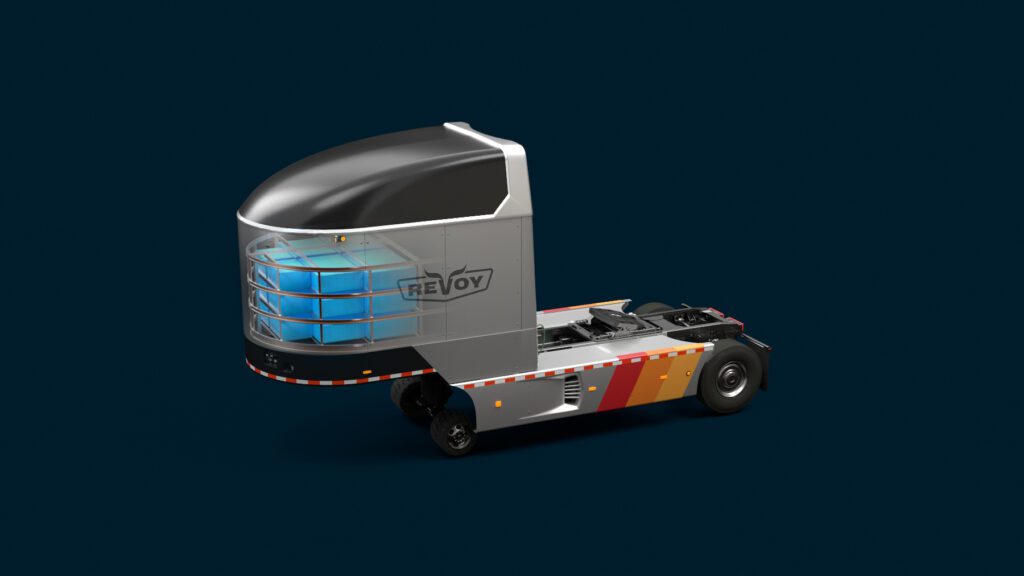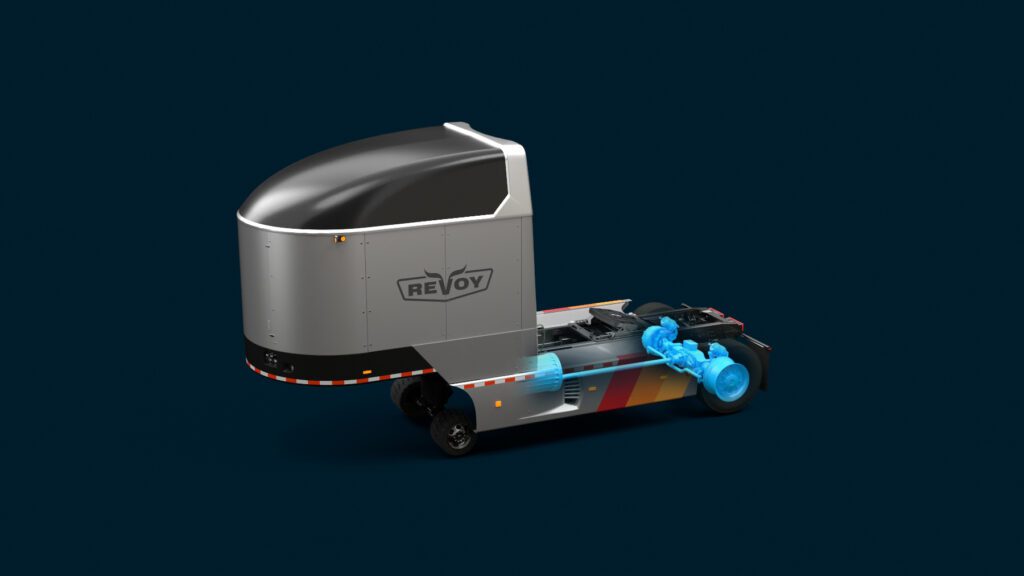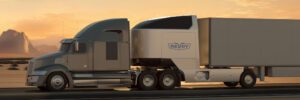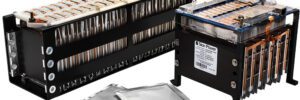GM takes another stab at a market it once abandoned: plug-in hybrids. Can this get the automaker where it needs to go?
Source: Electric Vehicle News
The 2025 Electric Jeep Wagoneer S: First Look Inside
The interior looks “tech-focused” with four screens and upmarket materials.
Source: Electric Vehicle News
December 2023 Was Not A Good Month For Hyundai BEV Wholesale Sales
The volume decreased by over 20% year-over-year, but the 2023 result is a record high.
Source: Electric Vehicle News
California's Plug-In Car Sales Almost Reached 25% Market Share In 2023
Roughly 440,000 rechargeable cars were registered last year, including 380,000 all-electric.
Source: Electric Vehicle News
Lucid CEO On Massive Factory Expansion: 'We've Got To Plan And Invest For The Future'
The EV startup just quadrupled the size of its Arizona manufacturing facility. Its Gravity SUV and a midsize car will be built there.
Source: Electric Vehicle News
Revoy’s battery trailer turns a semi-truck into a hybrid
Trucking firms are caught in a bit of a bind—emissions regulations are tightening, but electric heavy-duty trucks come with high upfront costs. A startup called Revoy offers an interesting transitional solution—the Revoy EV is basically a small trailer full of batteries that attaches to a diesel semi-truck to effectively turn it into a hybrid.
At Revoy’s swapping station in Dallas, the Revoy EV, with a pre-charged battery, is attached between a tractor and a semi-trailer. “That process takes about five minutes, which is actually faster than filling up a tank of diesel,” says Ian Rust, CEO and founder of Revoy. When the truck leaves Dallas, it drives 234 miles to a station in Arkansas for another quick swap.
The Revoy EV’s battery provides enough extra power to increase a rig’s fuel efficiency from 6-8 miles per gallon of diesel to 20-35 miles per gallon, cutting emissions by 70-80% and potentially saving a shipper as much as $25,000 in fuel costs per truck per year.


In addition to the up-front expense, trucking companies face a learning curve to go electric. The price of electricity can vary, so truckers may need to choose the right time to charge (or take advantage of a battery-buffered charging station). “It involves basically getting into the electricity market, not something trucking companies have traditionally done,” says Rust.
Revoy’s system charges its batteries only at times when the cost of electricity is low, and trucking companies pay only for the service, not the vehicles. The concept is a bit like battery swapping, but it’s far more flexible—attaching the Revoy EV between tractor and trailer is simple, and the technology can be used with any kind of truck. The system is designed to fit smoothly into the current process that shippers use. Unlike powered trailers made by Range Energy and others, the Revoy EV is used with a trucker’s existing trailers.
“They’re running their same route, and when they’re doing their regular stops, they’re just applying a Revoy EV and saving some money and largely decarbonizing,” Rust explains. “What we sell to our customers really is torque. They’re just getting power to haul their load, and that’s ultimately what they care about.”
The extra power also helps trucks accelerate faster—a handy safety feature—and the trailer features regenerative braking, which decreases the rig’s stopping distance by as much as 30%. Revoy’s technology also adds driver assistance features like blind spot detection, automatic reversing and auto-correction to help trucks prevent rollovers or jackknifing.a
After three years of R&D, Revoy is now in production, and is planning to add more swapping stations in Texas, Arkansas, California and Oregon. “The unit economics work,” Rust says. “The customers are loving it. And it’s just a matter of getting those swapping stations in more areas.”
Source: Fast company, Revoy
Source: Electric Vehicles Magazine
BVG Berlin orders 50 Solaris electric buses
Polish bus manufacturer Solaris has received an order for 50 of its Urbino 18 electric buses from Berlin public transport company BVG, which currently operates more than 120 Solaris Urbino 12 and Urbino 18 buses.
Delivery is scheduled for 2024 and 2025. The contract is part of a framework agreement that can be extended over the coming years.
The new buses are supplied with 240 kW asynchronous motors. They are also equipped with eSConnect, Solaris’s proprietary system designed to increase efficiency and streamline servicing.
“Solaris has already provided a significant number of battery buses to the BVG, which are in daily service on the streets of Berlin, thus contributing to a more sustainable environment within the city,” said Christian Goll, Managing Director of Solaris Deutschland.
Source: Solaris
Source: Electric Vehicles Magazine
Sion Power raises 75 million to commercialize its Licerion EV battery tech
Sion Power, a developer of next-generation batteries for EVs, has secured $75 million in Series A funding. The round was led by battery manufacturer LG Energy Solution, and included participation from Euclidean Capital and Hillspire.
Sion Power’s Licerion technology uses compression in a lithium metal battery to enhance safety, lifetime and recharging rates. Sion has successfully demonstrated Licerion in high-capacity battery cells (up to 20 Ah), and it is currently in development to reach 56 Ah.
Licerion batteries are produced at scale in large-format cells that deliver specific energy up to 500 Wh/kg.
Sion Power says it will use the new capital to achieve technical and market validation of its technology. The company plans to build a fully automated manufacturing line to produce large-format lithium-metal cells for testing and market development by automotive OEMs and cell manufacturers.
“Licerion directly addresses the anxiety that consumers feel about finding chargers by delivering up to twice the energy as conventional lithium-ion cells,” said Tracy Kelley, Sion Power’s CEO. “The support from our investors is a testament to how mature our technology is and the value of our approach towards enabling lithium-metal cells.”
“We’ve invested in Sion Power because its strong IP portfolio is critical to enable lithium-metal technology on a commercial basis. Its technology is superior to that of a conventional battery, with a scalable manufacturing process that offers a faster and lower-cost solution,” said Jim Simons, Chairman of Euclidean Capital.
Source: Sion Power
Source: Electric Vehicles Magazine
GM Still Expects Profitable EVs In The Second Half Of This 'Do-Over' Year
On GM’s Q4 earnings call and 2023 wrap-up, the automaker remains bullish on EVs—including EV profits—after a notoriously tough year.
Source: Electric Vehicle News
Emporia launches program to simplify EV charger installation
US energy management technology company Emporia has launched a program designed to streamline the installation of Level 2 EV home chargers, which can involve a complex process of research and comparing installation companies to ensure that a home’s electrical limitations are properly assessed before a vehicle is purchased.
Emporia is partnering with selected installers that include HelloTech, OnTech, Kopperfield and Treehouse. The program is intended to provide customers with fast and easy installation, transparent pricing and education on cost factors, quality of workmanship, availability of support, and access to necessary information for installation.
“By partnering with the best installers in the industry,” said Emporia CEO Shawn McLaughlin, “we aim to provide our customers with peace of mind, competitive pricing and an excellent customer experience from start to finish.”
Source: Emporia
Source: Electric Vehicles Magazine





